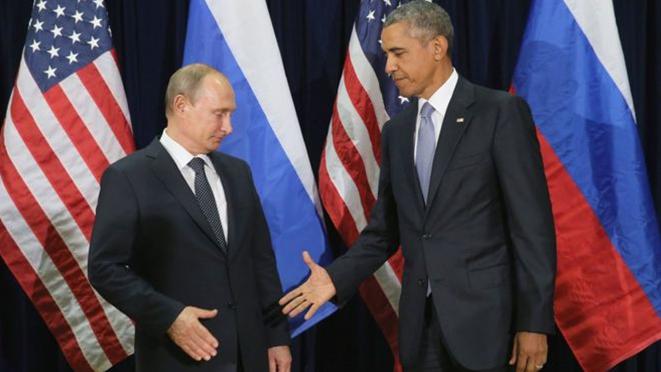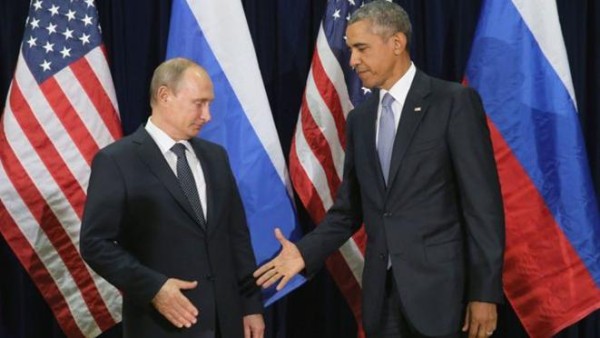During the third 2012 Presidential debate, President Obama mocked Mitt Romney’s claims that Russia was America’s greatest geopolitical foe. He accused Romney of seeing foreign policy through a Cold War lens, asserting that the Russian threat to America’s world leadership ended when the Soviet Union collapsed. Romney defended his position, claiming, “Russia does continue to battle us in the U.N. time and time again. I have clear eyes on this. I’m not going to wear rose-colored glasses when it comes to Russia, or Mr. Putin.”[ref]Jaime Fuller, “Was Mitt Romney Right about Russia (and Everything Else)? A Look Back at His Campaign Predictions,” Washington Post, Mar. 20, 2014.[/ref] The series of foreign crises since the 2012 election have convinced a, “consensus among U.S. officials that Mitt Romney was right. Vladimir Putin’s Russia is the most dangerous threat to America.”[ref] Matthew Continetti, “How to Confront Vladimir Putin,” National Review Online, Oct. 10, 2015. [/ref] How can the U.S. maintain diplomatic relations with Russia, while alleviating the crisis in Syria?
Russia is not the Soviet Union. The Kremlin no longer seeks a global communist revolution or the end of Western Democracy. Putin does, however, want to reassert Russian influence abroad. To do so requires Russia undermining America’s global hegemony and protecting allies like Iran and the Assad regime in Syria. Putin also wants to reunite the Russian-speaking people of Europe, who live in the Baltics, Ukraine, and other former Soviet territories. Ukraine, in particular, is Putin’s obsession. Putin views Ukraine’s independence as a mistake that should be reversed, which most Americans fail to understand. In 2013, “US and European leaders’ insistence that Ukraine was free to ally itself with the EU or even NATO sounded good in the abstract. But it ignored Russia’s views of its vital interests and Russia’s capacity and readiness to act to protect those interests. Having been invaded by Napoleon and Hitler, Russians are neuralgic about threats from their western front.”[ref] Graham Allison, “U.S.-Russia Relations: What Would Henry Kissinger Do?” The National Interest, Sept. 28, 2015.[/ref] NATO exemplifies Russia’s fear of the West. The Russian security establishment sees NATO as a major threat that is always seeking opportunities to move closer to Russia’s border. Russia wants Ukraine as a buffer against that threat. America and Russia could reach a common ground by establishing Ukraine as a neutral buffer state. That way, Ukraine would not become a Russian satellite, but Russia’s sense of security would not be threatened.
The 2014 Crimea crisis is proof that Putin’s foreign policy is reactionary. This means that, despite having clearer strategic objectives than the Obama Administration, Putin’s decisions are driven by the circumstances Russia faces. Henry Kissinger bluntly explained, “It is not conceivable that Putin spent 60 billion Euros on turning a summer resort into a winter Olympic village in order to start a military crisis the week after a concluding ceremony that depicted Russia as a part of Western Civilization.” [ref]Ibid.[/ref] The reactionary quality of Putin’s geo-strategy can also be seen in Syria. Putin’s recent interventions in Syria reflect his desire to keep his ally, Bashar Assad, in power. Doing so not only extends Russia’s influence in the Middle East, but also stabilizes Russia’s southern border from the threat of Islamic extremism. Kissinger explained, “Russia’s principal concern is that the Assad regime’s collapse could reproduce the chaos of Libya, bring ISIS into power in Damascus, and turn all of Syria into a haven for terrorist operations, reaching into Muslim regions inside Russia’s southern border in the Caucasus and elsewhere.” [ref]Henry Kissinger, “A Path Out of the Middle East Collapse,” WSJ, Oct. 16, 2015.[/ref] As of October 2015, both the American and Russian militaries have been conducting air strikes in Syria. Both target ISIS, but the Russians also bomb American-funded anti-Assad groups. Some candidates, such as Hillary Clinton and Marco Rubio, have called for a no-fly zone over Syria. This “would invite direct confrontation with the Russians, who are already buzzing NATO airspace from their new southern flank. Putin would like nothing more than to humiliate America over the skies of Raqqah.”[ref]Matthew Continetti, “How to Confront Vladimir Putin,” National Review Online, Oct. 10, 2015.[/ref] Putin offered an American-Russian collaboration against ISIS before intervening in Syria. The US should accept this idea. Although, “Russian pride will not allow Moscow to join a U.S.-led coalition, we should be able to work in parallel, coordinating air strikes and other actions for maximum effect in degrading ISIS.”[ref]Thomas Graham, “Russia’s Syria Surprise (And What America Should Do about It),” The National Interest, Sept. 15, 2015. [/ref] At the same time, the US should put diplomatic pressure on Russia to stop attacking the moderate rebels, but not take any military steps to oppose Russia’s actions. The threat of a confrontation between the world’s two greatest militaries is not worth the risk. Many American hawks claim that not standing up to Russia on this issue is the equivalent of Chamberlain’s appeasement of Hitler at Munich. A better analogy is Eisenhower allowing Khrushchev to crush the Hungarian Revolution in 1956. Eisenhower knew that American intervention against Soviet action could be catastrophic, and allowed the Hungarian rebels to be defeated. Americans must learn to recognize the difference between appeasement and strategic restraint.
America needs to play for time. Once Russia moves beyond the Putin era, the two countries can reconcile and collaborate in solving global issues. Until then, the United States must approach Russia on a case-by-case basis. America will oppose Russian aggression, like in the Crimean Crisis, but collaborate on issues like ISIS and the Iranian Nuclear Program. Although the Obama Administration has applied sanctions to Russia and diplomatically isolated Putin, tensions cannot be allowed to escalate to the point of a second Cold War. If that were to happen, American-Russian relations could be damaged for the long-term, with grave consequences for the world.
Take Action!
Take action and sign this petition!




